The debate around Privacy Coins vs Public Blockchains has intensified as crypto moves from experimentation to everyday finance. If you’ve ever wondered whether you actually need a dedicated privacy coin like Monero or Zcash, or if Bitcoin and Ethereum can be configured to provide “good enough” privacy, this in-depth guide will help you evaluate the trade-offs with real-world scenarios, practical tactics, and up-to-date context on tools and regulation.
Not financial or legal advice. Privacy is a spectrum shaped by technology, law, and your personal threat model.
Why Privacy Matters in Crypto
“Blockchain transparency” is often marketed as a virtue, and it is—until the details of your salary, donations, suppliers, or investment moves are trivially traceable forever. Privacy in crypto protects:
- Personal safety and dignity
- Business strategy and pricing power
- Nonprofit and journalist sources
- Competitive advantage and negotiations
The catch: privacy is not a single switch. It operates across layers—network, ledger, and usage behaviors. The right solution depends on who you’re protecting against and how persistent they are.
Public Blockchains Explained
Public blockchains such as Bitcoin and Ethereum publish transactions on a transparent ledger. Addresses are pseudonymous, not anonymous. With on-chain analytics and heuristic clustering (address reuse, timing, amount patterns, dusting), identities get linked over time.
Strengths:
– Radical auditability and verifiability
– Open composability for DeFi and apps
– Wide liquidity and tooling
Weaknesses:
– Transaction graphs are public and permanent
– Metadata leakage (IP, timing, device) can de-anonymize
– Privacy retrofits can be fragile or legally risky
What Are Privacy Coins
Privacy coins are blockchains that embed privacy at the protocol layer by default or as a first-class option. The leading approaches are:
-
Monero (XMR)
- Ring Signatures and RingCT hide the sender among a decoy set and conceal amounts.
- Stealth Addresses generate one-time destinations so the receiver’s address never appears on-chain.
- Dandelion++ and other network-layer defenses reduce IP leakage.
- Outcome: strong default privacy across sender, receiver, and amounts.
-
Zcash (ZEC)
- zk-SNARKs enable shielded transactions that hide sender, receiver, and amounts while proving validity.
- Two pools: transparent (t-addresses) and shielded (z-addresses). Choose shielded for privacy.
- Viewing keys and selective disclosure support compliance and audits when needed.
-
Mimblewimble (Grin, Beam)
- Confidential Transactions hide amounts; cut-through removes redundant data, improving scalability.
- Interactive transaction construction changes the UX but reduces on-chain footprint.
These designs prioritize unlinkability by default and minimize reliance on user discipline. That’s the critical difference from public chains where privacy often depends on careful habits and add-ons.
How Public Chains Try to Add Privacy
Even without switching chains, you can improve privacy on Bitcoin and Ethereum. Key approaches include:
-
CoinJoin/PayJoin (Bitcoin)
- Collaborative transactions break common-input ownership heuristics.
- PayJoin disguises payment flows by having the receiver co-spend an input.
-
Mixers and Pools
- Examples include Tornado-style mixers on Ethereum and collaborative coin mixing on Bitcoin.
- Strong technical privacy, but elevated legal and sanctions risk in many jurisdictions.
-
Layer-2 and ZK Systems
- zk-rollups and privacy-preserving smart contract systems (e.g., research inspired by Aztec) promise programmable privacy with L1 settlement assurances.
- Today’s mainstream rollups focus on scalability more than privacy; keep expectations grounded.
-
Address and Metadata Hygiene
- Use new addresses per payment, avoid linking identities across wallets, and route traffic through Tor or a VPN.
- Beware wallets and dApps that leak extended public keys, ENS names, or device fingerprints.
These methods help, but they are not the same as protocol-level privacy by default. One slip—address reuse, careless timing, revealing your ENS—and your graph can re-link.
Threat Models and Trade-Offs
Ask yourself:
- Who is the adversary? Curious acquaintances, sophisticated analytics firms, or state-level investigators?
- What do you need to hide? Sender identity, receiver identity, amounts, or all of the above?
- How long must privacy hold? Days, years, or indefinitely?
Privacy coins excel when you need robust defaults against graph analysis. Public chains excel for composability, liquidity, and ecosystem breadth. The middle ground—public chains with strong privacy tooling—requires discipline and constant vigilance.
Trade-offs to consider:
-
Liquidity and Acceptance
- Bitcoin and Ethereum have deeper markets, more payment options, and richer DeFi.
- Privacy coins may face exchange delistings and thinner liquidity in some regions.
-
Performance and Cost
- Ring signatures and ZK proofs add computation and data overhead, affecting fees and sync times.
- Public chains can be cheaper per transaction, but privacy add-ons may introduce extra steps or costs.
-
Compliance and Policy
- Zcash’s viewing keys enable selective disclosure for audits; this can matter for enterprises and NGOs.
- Mixers on public chains may carry sanctions risk; always check your jurisdiction.
Practical Use Cases
-
Business-to-Business Invoices
- Avoid revealing supplier margins and counterparties. Privacy coins or shielded Zcash can protect sensitive pricing.
-
Payroll and Contractor Payments
- Employees may not want their salaries searchable on-chain. Use privacy defaults or strict address rotation with CoinJoin.
-
Nonprofits and Journalists
- Donors and sources benefit from reduced exposure. Consider Zcash shielded pools or Monero.
-
Personal Finance
- Keep spending habits private without sacrificing self-custody. Combine good wallet hygiene with protocol-level privacy.
Interoperability and DeFi
Privacy coins historically lag in DeFi because private state is hard to compose openly. Workarounds include bridges, wrappers, and atomic swaps:
-
Atomic Swaps
- Trust-minimized swaps between BTC and XMR are possible, helping users move value without centralized intermediaries.
-
Bridges and Wrapped Assets
- Offer convenience but add smart contract and custodian risks. A bridge incident can nullify privacy benefits if logs or KYC records are exposed.
-
Emerging ZK Apps
- The dream is privacy-preserving smart contracts with verifiable proofs. Progress is rapid, but mainstream tooling is still maturing.
A Step-by-Step Privacy Playbook
1) Define your objective
– Do you need recipient privacy, sender privacy, hidden amounts, or all three?
– Are you operating under organizational policies that require auditability?
2) Choose the right substrate
– Monero for strong defaults across the board.
– Zcash shielded for privacy plus selective disclosure.
– Bitcoin/Ethereum for ecosystem breadth, augmented by CoinJoin and careful hygiene.
3) Harden your metadata
– New addresses per interaction, avoid cross-posting identities, use Tor or privacy-preserving relays.
– On Ethereum, consider separate wallets for DeFi, NFTs, and long-term holds.
4) Test your flows
– Send small amounts and verify that your transaction graph doesn’t leak obvious links.
– Periodically rotate wallets; assume adversaries can correlate timing and amounts.
5) Document compliance
– If you need audit trails, Zcash viewing keys or off-chain notarization can provide controlled transparency without full public exposure.
How to Acquire and Manage Responsibly
On-ramps, liquidity, and fees matter. If you plan to move between assets or need spot, margin, or derivatives liquidity, a major exchange can help—while you still maintain privacy off-exchange by withdrawing to properly managed wallets.
- Consider creating an account with a reputable exchange to access deep liquidity, then withdraw and apply your privacy flow.
- Take advantage of promotional fee savings to reduce costs when rotating positions.
Exclusive offer for readers:
– Get a 20% fee discount and access up to $10,000 in benefits when you register through this link: Join Binance with referral code CRYPTONEWER for a 20% fee discount and up to $10,000 in benefits.
– Bookmark the offer so you use the discount any time you onboard or rebalance: Binance signup with code CRYPTONEWER.
After funding, practice good OPSEC:
– Withdraw to your own wallet, verify addresses out-of-band, and avoid address reuse.
– For Bitcoin, evaluate CoinJoin/PayJoin tools. For Zcash, use shielded addresses; for Monero, follow wallet best practices and keep software current.
Myths and Realities
-
Myth: “Bitcoin is anonymous.”
- Reality: It’s pseudonymous. Identity can often be inferred over time from graph patterns and external metadata.
-
Myth: “Privacy coins are only for illicit activity.”
- Reality: Businesses protect pricing, NGOs protect donors, and individuals protect dignity. Privacy is a normal feature of money.
-
Myth: “Using a mixer makes you safe.”
- Reality: Mix quality, timing analysis, and legal risks vary. Use reputable tools within your jurisdiction’s laws or favor protocol-level privacy.
-
Myth: “ZK rollups make everything private.”
- Reality: Today’s popular rollups focus on scalability; privacy-preserving apps are emerging but not universal.
Compliance, Risk, and Policy
- KYC/AML and Travel Rule requirements affect how you move funds between custodial platforms.
- Some jurisdictions restrict mixer interactions or certain privacy tools.
- Zcash’s viewing keys enable selective disclosure—a practical compromise for enterprises.
- Keep records of legitimate sources and uses. Privacy and compliance can coexist with proper controls.
Selecting the Right Tool for Your Situation
-
Maximum default privacy with community-hardened tooling
- Choose Monero.
-
Strong privacy with optional auditability
- Choose Zcash shielded transactions.
-
Ecosystem breadth, DeFi access, and broad liquidity
- Choose Bitcoin/Ethereum with careful privacy practices.
A balanced strategy is common: use public chains for liquidity and applications, then move to privacy-preserving rails for sensitive flows and storage.
Quick FAQs
-
Are privacy coins illegal?
- Generally no, but regulations differ widely and certain tools are restricted in some regions.
-
Can Bitcoin be private?
- With discipline and tools like CoinJoin, you can improve privacy, but it rarely matches protocol-level privacy by default.
-
Do zero-knowledge proofs fix everything?
- They’re powerful, but UX, costs, and ecosystem support determine real-world privacy.
-
Will using a mixer get me in trouble?
- Depends on jurisdiction and the specific tool. Understand the legal context before use.
Action Steps You Can Take Today
- Map your privacy needs and legal environment.
- Decide whether you need protocol defaults (Monero/Zcash) or can operate on public chains with careful hygiene.
- Create an exchange account for liquidity and fee savings, then practice privacy off-exchange: Start on Binance with code CRYPTONEWER for a 20% fee discount and up to $10,000 in benefits.
- Document your process, rehearse small transactions, and iterate until you’re confident.
Further reading and tools:
– Monero documentation: https://www.getmonero.org/resources/
– Zcash documentation: https://z.cash/learn/
– Bitcoin privacy primers: https://en.bitcoin.it/wiki/Privacy
– Research on transaction graph analysis: search for academic surveys on blockchain analytics





